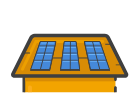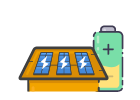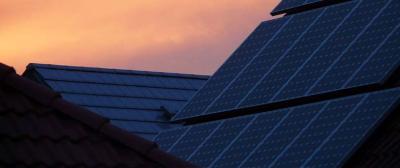Integrated Solar Panels in the UK: Costs + Pros & Cons in 2025
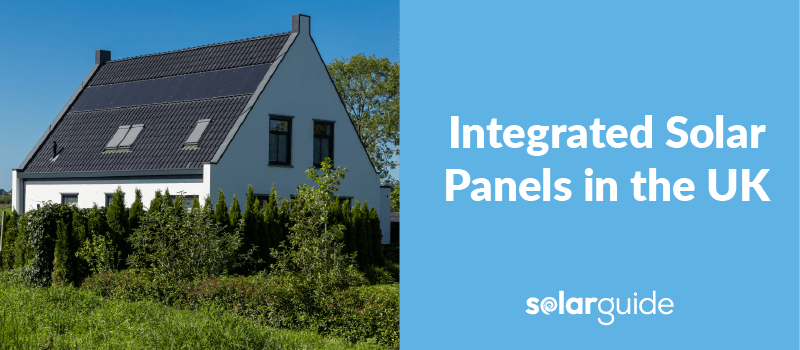
- Integrated solar panels are installed within the structure of your roof, rather than on top of its tiles like regular solar panels.
- Installing integrated solar panels for an average 3-bedroom home costs somewhere between £5,000 – £6,000. With such an installation, you can expect savings of up to £660 per year on your electricity bill.
- If you're looking to seamlessly blend form and functionality, then installing integrated solar panels might be a great option for you.
Want to join the millions of people who have reaped the benefits of installing solar panels for homes in the UK? Then it's worth giving some thought to integrated solar panels. These operate in the same way as traditional solar panels, but instead of being a bulky addition to your roof, they blend seamlessly into it.
To give you a better idea of what in-roof solar panels can add to your home, we'll walk you through their ins and outs in this comprehensive guide. If by the end you're still unsure whether integrated solar panels are the right choice for you, then you'll want to consult an installer who can offer you tailored advice.
Finding a professional you can trust on your own can be exhausting. Thankfully, we can help you avoid wasting hours of your precious free time and connect you with up to 4 installers vetted by us in no time. Simply click below, fill in our short form, and sit back and relax as they reach out to you with free, non-binding quotes!
Get your best deal
Quickly compare up to 4 free quotes

What are integrated solar panels?
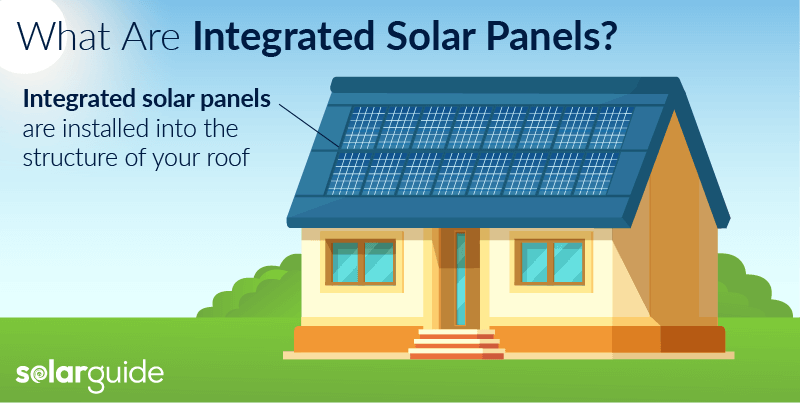
In essence, integrated solar panels are the same as traditional solar panels. They absorb sunlight and convert it into usable electricity for your home. The difference is that instead of being mounted on top of your roof, they are built into its structure.
This is done by replacing a section of your roof's materials with solar panels. As a result, installing in-roof solar panels is a great option if you're adding them to a building under construction or if you're replacing an old roof.
Although sometimes mistakenly referred to as solar roof tiles, integrated solar panels are not designed to look like tiles or slates, so they aren't generally a complete roofing solution. So, when installing in-roof solar panels, you'll still need to account for other materials in your planning and calculations of in-roof solar panels costs.
Integrated solar panels vs regular solar panels
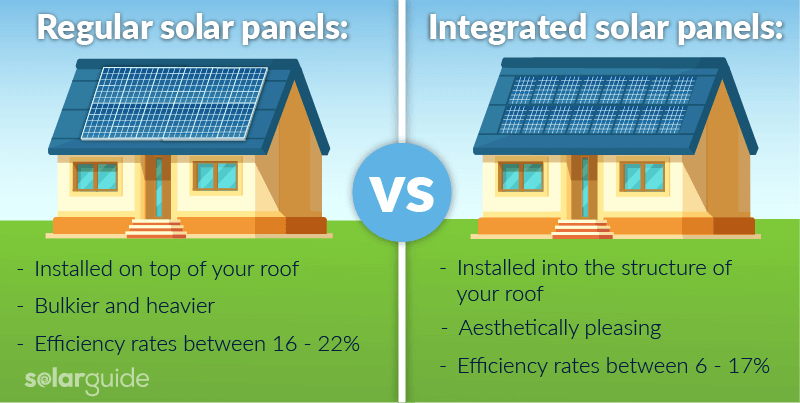
Traditional solar panels and integrated solar panels are very similar in terms of how they operate. The primary difference between them is that regular solar panels are installed on top of your roof and can have a bulky appearance, whereas built-in solar panels are more aesthetically appealing.
Here's an overview of some of the other differences between regular and integrated solar panels:
| Feature | Regular Solar Panels | Integrated Solar Panels |
|---|---|---|
| Installation | On top of the roof | Integrated in the roof's structure |
| Efficiency | 16 – 22% | 6 – 17% |
| Cost (2 – 3 bedroom home) | £5,000 – £6,000 | £5,000 – £6,000 |
As you can see, one of the main differences lies in the efficiency of solar panels. Before deciding to install integrated solar panels, be sure to weigh their pros and cons against regular solar panels. This way, you ensure that your solar system can adequately attend to your household's energy needs.
Costs of integrated solar panels in the UK
If you're considering installing in-roof solar panels, you'll want to know how much solar panels in the UK cost. For an average 2 – 3 bedroom household, integrated solar panels cost somewhere between £5,000 – £6,000.
You can find an overview of how much in-roof solar panels cost per different home sizes below:
| Household Size | Solar System Size | Estimated Solar System Cost | Estimated Installation Costs | Estimated Total Costs |
|---|---|---|---|---|
| 1 – 2 bedrooms | 2 – 3kW | £1,900 – £4,900 | £600 | £2,500 – £5,500 |
| 2 – 3 bedrooms | 4 – 5kW | £4,200 – £7,700 | £800 | £5,000 – £8,500 |
| 4 – 5 bedrooms | 6kW | £8,300 – £9,300 | £1,200 | £9,500 – £10,500 |
As you can see, installing solar panels isn't cheap. Thankfully, there are several solar panel grants available in the UK. By applying, you can lessen the blow to your bank account, while still reaping the long-term benefits of solar energy.
Some funding initiatives include the Smart Export Guarantee (SEG), which can help you earn up to £85 per year by selling solar energy back to the grid, and the 0% VAT. The VAT reduction can lead to savings of over £1,850 on solar panel installation.
Another sure way to lower your expenses is to work with an installer that has some of the lowest service costs on the market. Finding one on your own requires hours or even days of research and price comparisons. As a busy homeowner, we understand that you may not have such time to spare. That's why we're here to help you get started in less than 1 minute.
All you have to do is fill in our short form and we'll put you in touch with up to 4 solar panel installers in your area. They'll reach out to you with quotes for their services, so that you can easily compare figures and secure the best solar panels for your home. Just click below to request free, no-obligation quotes now!
Get your best deal
Quickly compare up to 4 free quotes
- It's free, easy and without obligation
- Compare quotes & get the best prices
- Save up to £915 per year

Break-even point and return on investment for integrated solar panels
One of the greatest benefits of installing integrated solar panels is that they lower your electricity bills over time. Take a look at the table below to get an idea of how much you can save per system size:
| Solar System Size | Initial Cost | Estimated Annual Savings | Break-Even Point | Return on Investment |
|---|---|---|---|---|
| 3kW | £4,500 – £5,500 | £440 | 9 years | £5,500 – £6,500 |
| 4kW | £5,000 – £6,000 | £660 | 8 years | £10,500 – £11,500 |
| 6kW | £9,500 – £10,500 | £1,005 | 10 years | £15,000 – £16,000 |
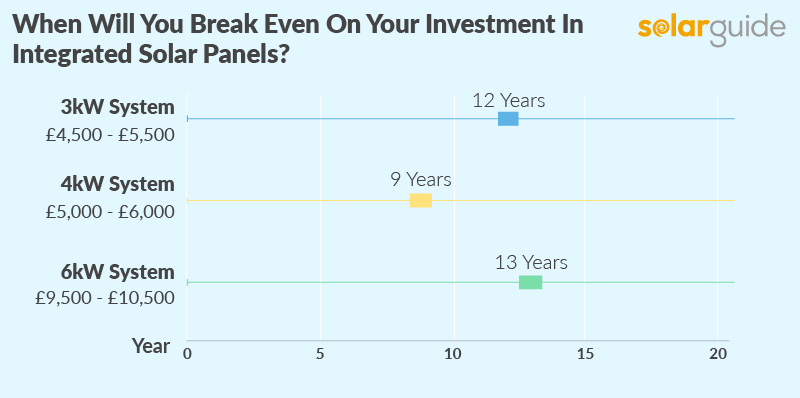
While they are a significant initial expense, you'll break even on your investment in integrated solar panels long before the end of their lifetime. Since they have a lifespan of about 25 years, you can fully enjoy their functional and financial benefits for years to come.
What are the advantages and disadvantages of in-roof solar panels?
To be able to determine whether integrated solar panels are the best choice for your home, you'll need to carefully consider their advantages and disadvantages.
Advantages of integrated solar panels
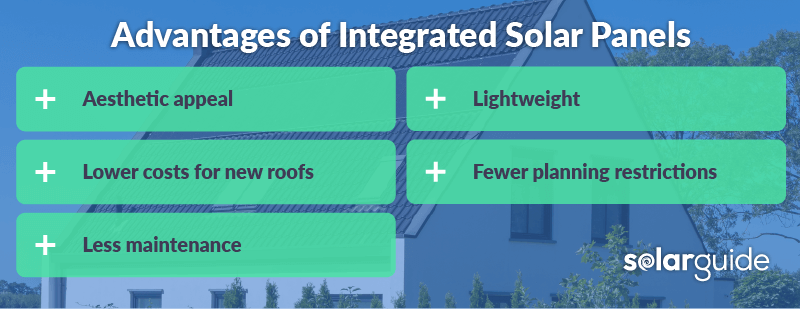
- Aesthetic appeal: Because they blend seamlessly into your roof's structure, integrated solar panels offer a sleek look. While to some people regular solar panels can be unappealing, an in-roof solar system is a great solution if you want to prioritise your home's design.
- Lightweight: Unlike a traditional solar panel, which weighs around 18 – 24kg, putting some strain on your roof, integrated solar panels weigh about 10 – 20kg per panel.
- Lower costs for new roofs: If you're adding integrated solar panels as your roof is being constructed, you may find that they will cost less than other roofing materials. For instance, tiles for an average 2 – 3 bedroom home cost over £15,000. In-roof solar panels, on the other hand, are around £5,000 – £8,500.
- Fewer planning restrictions: Integrated solar panels are designed to sit flush with your roof, having a less visible impact on your home's overall design. As a result, they are more likely to meet the requirements of local authorities when it comes to modifications to buildings in conservation areas.
- Less maintenance: Since the solar panels are built into your roof, there are fewer gaps and exposed parts that can accumulate debris or suffer damage from harsh weather conditions. All you need to do is ensure that the surface of your integrated solar panels is clean.
Disadvantages of integrated solar panels

- Lower efficiency rates: Integrated solar panels can be about 5 – 10% less efficient than traditional systems. This is because they don't have enough ventilation space, causing them to operate at higher temperatures. This takes a toll on efficiency rates and potentially on your annual savings.
- Higher costs for an existing roof: While adding in-roof solar panels to an existing roof is possible, this is a more complex and potentially costly installation than on-roof panels. Exactly how much more you'll end up spending depends on the size of your roof and the duration of the installation process.
- Potential overheating: Because they sit flush with the roof, the airflow around the panels is limited, which reduces the efficiency of integrated solar panels. Without adequate air circulation, they reach higher operating temperatures, which reduces their efficiency.
Are integrated solar panels something for your UK home?
If you want to enjoy all the benefits of solar panels without compromising on your home's aesthetic appeal, then integrated solar panels might just be the best option for you.
Once installed, you can enjoy free clean electricity from your solar system, as well as annual savings of up to £1,005. However, before moving on with the installation process, it's important to consider whether your roof is suited for integrated solar panels. You should also keep in mind their lower efficiency ratings and find out if these will affect your energy consumption.
No clue how to determine whether built-in solar panels are the right choice for you? Then you'll need to consult a solar expert who can provide you with tailored advice. They can help you answer questions like: "Are integrated solar panels suitable for my roof?" or "How many solar panels do I need?"
Looking for a professional you can trust can take hours if done on your own. Fortunately, we've done the research for you and we can connect you with up to 4 local installers in no time. Just fill in our short form to request quotes for an integrated solar panel installation.
All quotes are free and non-binding, so click below to get started in less than 1 minute!
Get your best deal
Quickly compare up to 4 free quotes

FAQ
What is an integrated solar panel?
Integrated solar panels are installed in the structure of your roof. They work like traditional solar panels, absorbing sunlight and converting it into electricity for your home.
What are the disadvantages of integrated solar panels?
The disadvantages of integrated solar panels include lower efficiency rates, their higher costs when installed in an existing roof, and the fact that they can potentially overheat.
Do I need planning permission for integrated solar panels?
Generally speaking, you don't need planning permission to install integrated solar panels. However, it's important to consult a solar panel installer who can offer you advice based on your specific situation.
Find local, MSC certified Solar Installers
Start your quote
Find local, MSC certified Solar Installers






